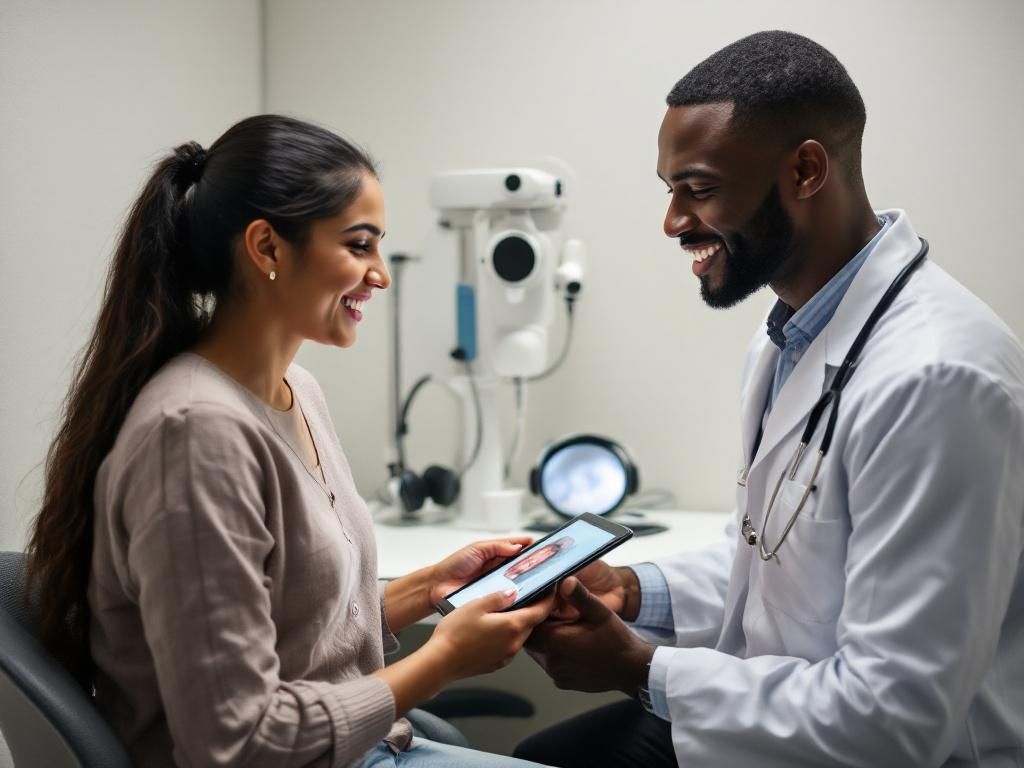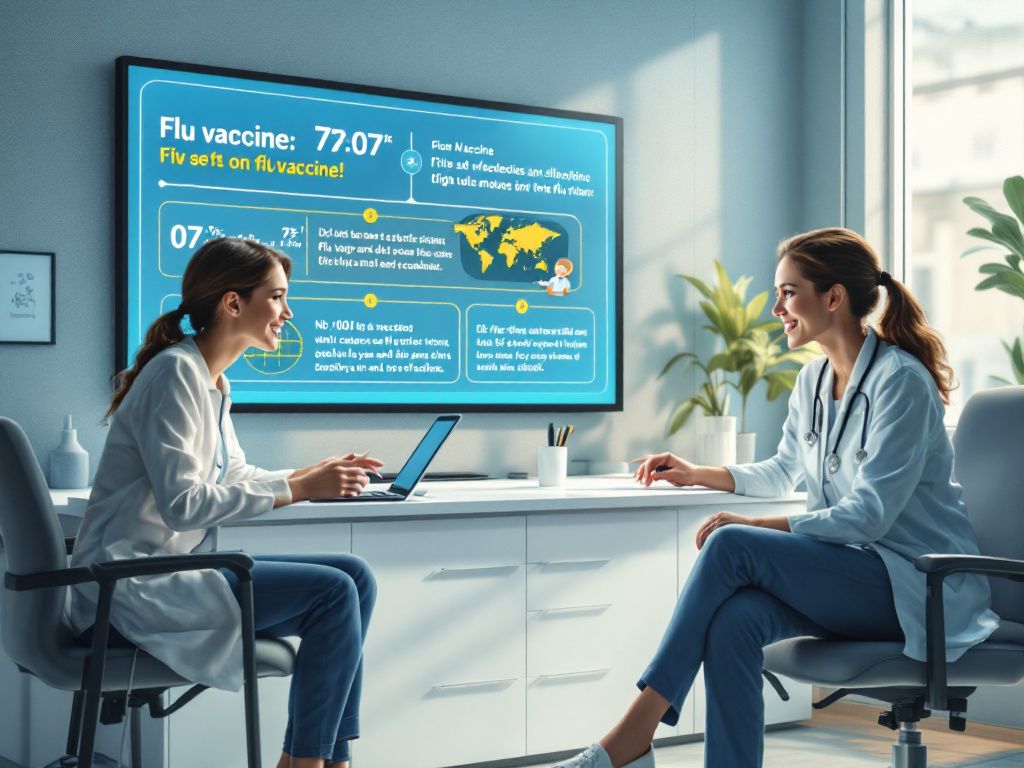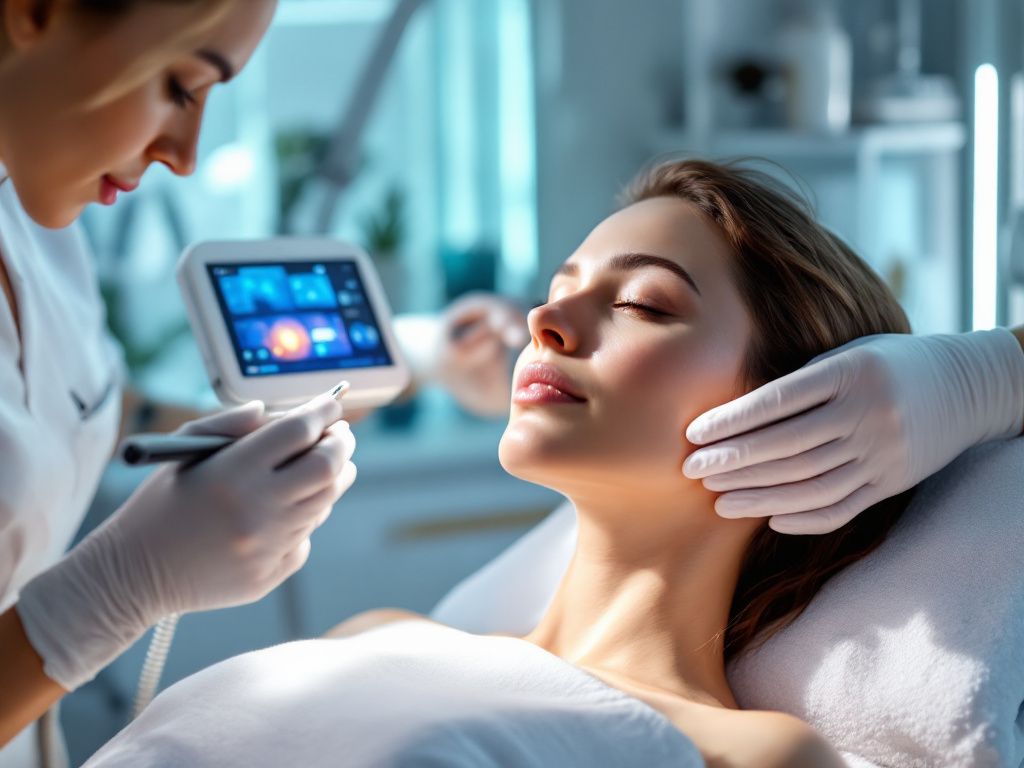Birth Control Myths vs Facts: Expert Pharmacy Perspective In today’s world, conversations about birth control are evolving rapidly with a mix of reliable information and enduring myths circulating both online and offline. At Ash Pharmacy, we understand that these myths can lead to confusion among patients and healthcare professionals alike. In this article, we examine some of the most common misconceptions surrounding birth control and provide factual, evidence‑based information to empower you with the knowledge needed for informed decision‑making. Myth 1: Birth Control is 100% Effective Many people believe that using birth control methods, especially the pill, guarantees complete prevention of pregnancy. However, the reality is that no method is infallible. Birth control methods offer high effectiveness when used perfectly, but typical use may result in lower effectiveness. Factors such as missed doses, interactions with other medications, or human error can contribute to unexpected failures. For those seeking the highest level of efficacy, consulting with healthcare professionals can help determine if alternative methods like intrauterine devices (IUDs) or implants are more suited to their lifestyle. Myth 2: The Pill Causes Significant Weight Gain A persistent myth is that hormonal birth control leads inevitably to weight gain. Scientific studies have shown that while some individuals might experience minor fluid retention, the majority do not experience substantial changes in body weight attributable solely to the pill. Hormonal fluctuations can affect each person differently, and overall healthy lifestyle practices remain the key to managing weight effectively. Patients and healthcare providers should therefore discuss any concerns around hormones and side‑effects to tailor the most appropriate method. Myth 3: Birth Control Can Be Stopped and Restarted Without Issues It is often assumed that if you discontinue birth control for a while, your fertility will automatically and instantly return to normal. However, the process can vary from individual to individual. Some may experience a brief period of adjustment before their natural cycles resume, while for others, the hormonal changes might take a little longer to settle. It is recommended that patients consult with their healthcare provider if they are planning to stop or restart contraception, ensuring a smooth transition and minimising any potential side‐effects. Myth 4: Oral Contraceptives Cause Infertility Another common myth is that prolonged use of oral contraceptives might lead to permanent infertility. Although hormonal birth control methods temporarily suppress natural ovulation, extensive research indicates that fertility typically returns to normal soon after discontinuation. In fact, many women find that their regular menstrual cycles resume fairly quickly, allowing them to conceive when they choose to do so. Reliable advice from medical professionals can help dispel these concerns, and reassure those worried about long‑term reproductive health. Myth 5: The Pill is the Only Option for Women While the pill is a widely used method of contraception, it is by no means the only option available. Birth control is an area where personalisation matters, and there are numerous alternatives available that cater to different lifestyles, health needs, and personal preferences. These include patches, injections, IUDs, implants, and even barrier methods. A thorough discussion with a healthcare provider at Ash Pharmacy can help identify the most suitable method, taking into account individual health factors and lifestyle choices. Myth 6: Birth Control Protects Against Sexually Transmitted Infections (STIs) Although many believe that using hormonal birth control or condoms offers comprehensive protection, it is important to note the limitations of each method. While condoms provide a barrier against many STIs, hormonal methods such as the pill, patch, or IUD do not protect against infections at all. Being well‑informed means understanding that for complete protection from both pregnancy and STIs, combining methods or adopting safer sex practices may be necessary. Now is the time to consult with your trusted healthcare professional for advice tailored to your personal risk profile. Myth 7: Side‑Effects of Birth Control Are Universal and Unmanageable The narrative that all users of birth control suffer severe side‑effects is another myth that often discourages women from using these methods. In truth, side‑effects vary widely and many people experience none at all. Modern contraceptives are designed to offer a range of options for different hormonal needs, minimising adverse reactions. If you are experiencing side‑effects, it is crucial to speak with your healthcare provider rather than discontinuing the method abruptly. Adjustments in dosage or method can often resolve these issues, ensuring that you continue to enjoy the benefits of effective contraception without undue discomfort. Making Informed Choices for Your Health The journey towards choosing the right birth control method should be guided by factual information and personalised medical advice. Dispelling myths not only alleviates anxieties but also enables both patients and healthcare professionals to collaborate more effectively in the pursuit of optimal reproductive health. At Ash Pharmacy, we are committed to providing precise, evidence‑based guidance that takes into account your unique health needs. With our customised private services and expert advice, we empower you to make informed decisions about your health. Your Next Step If you have further questions or require personalised advice about birth control options, consider reaching out to our experienced team. We pride ourselves on offering a trusted, conversational approach that bridges the gap between complex medical information and everyday health decisions. For personalised support and expert guidance, please feel free to book an appointment with us today. Your journey to informed health choices begins with a simple step towards consultation.
FAQs About Pharmacy Weight Loss Services
FAQs About Pharmacy Weight Loss Services At Ash Pharmacy, we understand that losing weight can be both a personal and medical journey. Our purpose is to provide comprehensive weight loss services tailored to individual needs, offering expert guidance, personalised consultations, and ongoing support. In this article, we answer common questions from both patients and healthcare professionals regarding our pharmacy weight loss services, clarifying how we work, the science behind our methods, and what you can expect when you book an appointment with us. What Are Pharmacy Weight Loss Services? Pharmacy weight loss services involve a multifaceted approach to managing weight that combines the expertise of healthcare professionals with practical, medically approved interventions. At Ash Pharmacy, our services include nutritional counselling, medication reviews, and lifestyle advice, all designed to ensure safe and effective weight management. Our team works closely with patients to monitor progress, understand challenges, and adjust treatment plans as necessary, ensuring each individual receives a tailored programme that fits with their needs and lifestyle. How Do Pharmacy Weight Loss Services Differ From Commercial Weight Loss Programmes? Unlike commercial weight loss programmes that often emphasise a one-size-fits-all approach, pharmacy weight loss services are grounded in clinical evidence and personalised care. At Ash Pharmacy, we consider your overall health, medications, and any underlying conditions before recommending a course of action. Our professionals not only advise on diet and physical activity but also review any potential interactions between your current medications and weight loss treatments, prioritising your safety and efficacy of the treatment plan. Who Can Benefit From These Services? Pharmacy weight loss services are beneficial for a wide range of individuals. Whether you are embarking on a new weight loss journey, managing obesity-related conditions, or looking for post-treatment support after other interventions, our experienced team can help. These services are particularly useful for those who may have underlying health concerns or who require ongoing medical supervision to ensure that weight loss strategies are both safe and effective. Healthcare professionals may also recommend our services to patients needing a structured and monitored weight management programme. What Is the Process for Starting a Weight Loss Programme at Ash Pharmacy? Your journey to better health begins with a comprehensive initial assessment. This typically involves a detailed consultation with one of our healthcare professionals, during which we discuss your medical history, current medications, diet, lifestyle habits, and personal goals. Based on this consultation, we develop a customised weight loss plan, which may include dietary modifications, physical activity guidelines, and sometimes medication if required. We encourage you to consider taking the first step by booking an appointment through our online booking system. How Do Medications Fit Into Weight Loss Management? Medications can play a crucial role in weight management, particularly for individuals who have struggled with traditional methods such as strict dieting or increased physical activity alone. At Ash Pharmacy, any decision to include medication in your weight loss regimen is made after a thorough evaluation of health risks and benefits. We ensure that the medications prescribed are evidence-based and tailored to your specific metabolic needs. Continuous monitoring is also provided to adjust dosages and avoid any interactions with other treatments you might be undertaking. What Role Does Nutritional Counselling Play? Nutritional counselling is an integral part of our weight loss services. We believe effective weight management starts with a balanced, sustainable diet. Our experts provide advice on portion control, nutritional balance, and healthy eating habits that go beyond conventional diets. This guidance is essential in not only shedding excess weight but also in achieving optimal long-term health. Through regular follow-ups, we help you overcome challenges and make adjustments to your diet, ensuring consistent progress towards your health goals. How Is Progress Monitored Throughout the Programme? At Ash Pharmacy, continuous monitoring is key to the success of any weight loss programme. During your scheduled appointments, our team reviews your progress through a combination of physical assessments, body measurements, and discussions about your diet and lifestyle. This regular monitoring allows us to adjust your programme as needed, ensuring it remains aligned with your evolving needs and goals. We pride ourselves on maintaining clear and supportive communication throughout your journey. Are There Any Risks or Side Effects? As with any health-related programme, there are potential risks and side effects to consider when it comes to weight loss treatments. However, by choosing a pharmacy-based service like ours, you benefit from professional oversight that minimises these risks. Our team thoroughly evaluates your health history to identify any contraindications. If medications are prescribed, they are closely monitored to manage and mitigate side effects. Should you experience any adverse effects, we are committed to making the necessary adjustments to your treatment plan immediately. What Support Is Available After the Initial Programme? Weight management is a long-term commitment and not a one-off effort. After the initial programme, Ash Pharmacy continues to offer support through follow-up appointments, group sessions, digital resources, and personalised advice. Our ongoing support ensures that once you achieve your desired weight, you can maintain a healthy lifestyle and avoid relapses. This commitment to continuous care is one of the ways we distinguish our services from other weight loss options available today. How Can Healthcare Professionals Collaborate With Ash Pharmacy? For healthcare professionals, partner pharmacies offer valuable support by managing aspects of patient care that require regular monitoring and personalised adjustments. Ash Pharmacy welcomes collaboration with GPs and other medical specialists by providing detailed progress reports, medication management insights, and joint consultations when necessary. This integrated approach ensures that patients receive a coherent, multi-disciplinary treatment plan, bolstering their success and improving health outcomes. What Should I Do To Get Started? If you are considering weight loss services and would like a professional, supportive, and tailored approach, Ash Pharmacy is here to help. Booking an appointment is simple; you can easily schedule a consultation through our Book Now page. Our team is ready to guide you through each step, ensuring you receive dedicated care aimed at achieving your goals. Begin your
Pharmacy vs Home Monitoring: Which Blood Pressure Check Is More Reliable?
Pharmacy vs Home Monitoring: Which Blood Pressure Check Is More Reliable? Monitoring your blood pressure is a crucial part of managing your health, especially if you have conditions such as hypertension or heart disease. With advances in medical technology, people now have multiple options, including pharmacy-based and home monitoring methods. In this article, we explore the merits and limitations of each approach, aiming to provide an informative comparison that benefits both patients and healthcare professionals. We will also offer guidance on which method may best suit your needs and circumstances. Understanding the Importance of Accurate Blood Pressure Monitoring Accurate blood pressure readings are essential for diagnosing high blood pressure, assessing cardiovascular risk, and guiding treatment decisions. Even slight variations in readings can influence treatment plans and lifestyle adjustments. As blood pressure naturally fluctuates throughout the day, the context in which it is taken—whether in a clinical setting at a pharmacy or in the comfort of your own home—can impact the results. For many, the decision between a pharmacy check and home monitoring comes down to the balance between convenience, reliability, and professional oversight. This article will provide an in-depth comparison to help you decide which approach fits best into your health management routine. Pharmacy Blood Pressure Monitoring Pharmacies, such as Ash Pharmacy, often offer blood pressure monitoring services as part of their private health services. This option is particularly popular for patients who value professional expertise and immediate access to advice, should any anomalies be detected. Advantages of Pharmacy Monitoring One of the primary benefits of having your blood pressure checked at a pharmacy is the involvement of a healthcare professional. Trained staff can ensure that the measurement is taken correctly, using properly calibrated equipment and standardised protocols. This reduces the risk of errors that might occur when measurements are done incorrectly at home. Additionally, the clinical environment can help minimise anxiety-related factors, as professionals are on hand to explain the process and reassure patients. This interaction not only lends credibility to the reading but also facilitates immediate advice regarding blood pressure management, such as recommendations for lifestyle changes or the need for consultation with a doctor. Considerations for Pharmacy Monitoring Despite these advantages, there are also practical considerations when opting for pharmacy monitoring. The environment in a busy pharmacy can sometimes contribute to what is known as “white coat syndrome,” where patients experience a temporary spike in blood pressure due to stress or nervousness. Although the professional setting is designed to be reassuring, this reaction can lead to readings that might not reflect the patient’s typical blood pressure levels. Another factor is accessibility. While many pharmacies offer extended hours, the need to travel to the location can be inconvenient for some, particularly those with mobility challenges or time constraints. However, for those who value accuracy and a second opinion during their check-up, the benefits are significant. Home Blood Pressure Monitoring Home blood pressure monitoring has become increasingly popular as a method for continuous self-assessment of heart health. Using devices that are now widely available, patients can track their blood pressure in their normal daily environment. Advantages of Home Monitoring Home monitoring allows individuals to take multiple readings at different times throughout the day, offering a more comprehensive picture of their blood pressure trends. This can be particularly informative, as readings taken in a familiar and relaxed setting can avoid the stress-related variations typically seen in clinical settings. Furthermore, having a home monitoring system promotes patient empowerment and engagement in managing their own health. By tracking trends over time, patients can better understand how their lifestyle, diet, and exercise choices influence their blood pressure. This consistent monitoring can also help in identifying patterns and potential triggers for high blood pressure. Limitations of Home Monitoring Despite its convenience, home monitoring does come with challenges. One of the primary limitations is the potential for user error. Unlike professional settings, home readings are particularly sensitive to how the measurements are taken. Factors such as incorrect cuff placement, improper posture, or not following device instructions can all lead to inaccurate readings. Moreover, while many modern home devices are user-friendly, the responsibility for maintaining and calibrating the equipment rests solely on the patient. Without regular calibration checks, the accuracy of these devices may deteriorate over time. It is also important to note that without professional oversight, abnormal readings may go unchecked, which could delay the detection of underlying health issues. Comparing the Reliability of Pharmacy and Home Monitoring The reliability of blood pressure readings depends on several factors, including the device used, the environment, and the person taking the measurement. Pharmacy-based monitoring offers professional oversight, which typically ensures that readings are taken in a consistent and standardised manner. However, the potential for anxiety-related readings is a noteworthy consideration. Home monitoring, on the other hand, gives a more natural representation of one’s daily blood pressure levels by eliminating the stress associated with clinical settings. Still, the possibility of human error and equipment issues means that these readings may sometimes be less accurate. For many patients, the best approach is to use home monitoring as a supplementary tool and to validate any concerns with a professionalised pharmacy check. When comparing both methods, one must consider personal circumstances. For patients with access to reliable pharmacy services and who value immediate professional feedback, pharmacy monitoring is a preferable option. Conversely, those who are comfortable managing their own health and desire a broad collection of data may find home monitoring beneficial, provided they receive periodic professional assessments to verify their readings. Which Method Is More Reliable? There is no one-size-fits-all answer to which method is ultimately more reliable. Both pharmacy and home blood pressure checks have their own strengths and potential pitfalls. For patients seeking precision and expert evaluation, a pharmacy-based reading may be more reliable. However, if you prefer a holistic view of your blood pressure trends, home monitoring, with its ability to provide multiple daily readings in a natural environment, may be more informative. The key to
What Vaccines Do I Actually Need? Pharmacy Travel Clinic FAQs
What Vaccines Do I Actually Need? Pharmacy Travel Clinic FAQs Travel can be an incredibly enriching experience, but ensuring you have the right protection in place is essential to a safe and healthy journey. At Ash Pharmacy, our private pharmacy travel clinic is dedicated to providing you with clear, accurate, and consistent information about travel vaccines. We understand that the world of immunisations can seem confusing, so we have compiled this FAQ to help answer your key questions and guide you in making informed decisions about your health and travel plans. What Are Travel Vaccines and Why Do I Need Them? Travel vaccines are immunisations recommended to protect you against diseases that might be more prevalent in the regions you plan to visit. While common vaccinations such as tetanus and influenza are important, certain regions require or suggest additional vaccines due to local health risks. Whether you are travelling for leisure, work, or study, these vaccines help ensure you are safeguarded against potentially serious illnesses. Our pharmacy travel clinic is designed to provide a tailored approach, assessing your travel itinerary, medical history, and vaccination status to determine exactly which vaccines you need. How Do I Know Which Vaccines Are Right for Me? The decision on which vaccines you require depends on several factors, including your destination, the duration of your trip, and any underlying health conditions you may have. For instance, travellers heading to tropical or subtropical areas might need vaccines such as yellow fever, hepatitis A and B, or typhoid, while other regions might have different recommendations. At Ash Pharmacy, our experienced healthcare professionals thoroughly review your travel plans and medical background to advise on the most appropriate vaccines. This personal consultation ensures that you receive a customised immunisation plan that meets your needs. Which Vaccines Are Commonly Recommended for Travellers? There are several vaccines commonly advised for international travellers. These often include hepatitis A, typhoid, and influenza vaccines, along with boosters for tetanus if necessary. Depending on your destination, additional vaccines such as those for yellow fever, Japanese encephalitis, or meningococcal disease might also be recommended. It is important to remember that vaccine schedules and recommendations can change, so staying updated with local health advisories and consulting with a healthcare professional is key. Our team at Ash Pharmacy remains up-to-date with the latest travel health guidelines to offer you the best advice. What If I’ve Already Been Vaccinated in the Past? If you have received vaccinations in the past, it may still be necessary to consider boosters or additional immunisations when planning international travel. Some vaccines require periodic re-administration to maintain their effectiveness, while others offer life-long protection. During your consultation at our travel clinic, we will review your vaccination history in detail. Understanding your previous immunisations helps us determine whether you are fully protected or if you might need any further doses before you depart. It’s always best to be proactive and ensure your immunity is up to date, especially if you are venturing into areas where certain diseases are endemic. How Soon Before Travel Should I Get Vaccinated? Timing is a crucial factor when it comes to vaccinations. Most vaccines require a period of time – often a few weeks – to build up adequate immunity. In some cases, you may need a series of doses over several weeks or months. This means that arranging your appointment with a reasonable window before your departure is essential. Our team at Ash Pharmacy advises scheduling your travel consultation as soon as your travel dates are confirmed. This approach provides ample time for any necessary vaccines to take full effect as you prepare for your journey. Are There Any Side Effects or Risks Associated with Travel Vaccines? Like any medical treatment, travel vaccines can sometimes cause minor side effects. These are typically short-lived and might include soreness at the injection site, a mild fever, or general tiredness. Severe adverse reactions are very rare. Our healthcare professionals conduct thorough assessments to rule out any contraindications and ensure that any vaccine administered is safe for you. It is important to discuss your complete health history during your consultation so that we can provide the most appropriate advice. At Ash Pharmacy, your safety is our top priority, and we follow all national health guidelines to offer you secure vaccine options. How Can Ash Pharmacy’s Travel Clinic Help Me? Ash Pharmacy is committed to making the process of preparing for international travel as stress-free as possible. Our dedicated travel clinic offers personalised consultations where we consider your itinerary, medical history, and current vaccine status. We then provide clear, actionable recommendations tailored to your unique circumstances. In addition to vaccines, our team provides advice on other travel health matters, ensuring that you are well-prepared for your upcoming adventure. Whether you’re embarking on a short holiday or an extended overseas stay, our private pharmacy services ensure you receive efficient, professional care every step of the way. In summary, understanding what vaccines you actually need can significantly ease the worries associated with travel health. Being proactive about your immunisation needs not only protects you but also contributes to the overall well-being of communities you visit. If you have further questions or if you’re ready to ensure you’re fully protected before your next journey, we encourage you to book an appointment. Our friendly team at Ash Pharmacy is on hand to provide expert guidance and support, ensuring you leave with the confidence and care you deserve. For a personalised consultation, please visit our booking page and start your journey towards a healthier travel experience today.
Do You Really Need Vitamin B12 Supplements? Pharmacy FAQs
Do You Really Need Vitamin B12 Supplements? Pharmacy FAQs Vitamin B12 plays a crucial role in many of the body’s functions, from energy production to neurological health. In this article, we address some of the most common questions patients and healthcare professionals have regarding vitamin B12 supplements. Our aim is to provide clear, factual, and reliable guidance while helping you decide if supplementation might be right for you. Whether you are considering supplements as part of your wellness journey or advising patients on their healthcare needs, this FAQ offers practical and evidence‑based insights. What is Vitamin B12 and why is it important? Vitamin B12, also known as cobalamin, is an essential water‑soluble vitamin that is integral to the functioning of the brain and the nervous system. It aids in the formation of red blood cells and DNA synthesis, making it indispensable for overall health. A deficiency in vitamin B12 can lead to neurological issues as well as blood disorders such as anaemia. Given its importance, understanding your vitamin B12 status is key in maintaining both short‑ and long‑term health. How do I know if I have a vitamin B12 deficiency? Many individuals with low levels of vitamin B12 may experience symptoms such as fatigue, weakness, numbness or tingling in the hands and feet, and difficulties with balance and memory. However, these symptoms can be subtle and may mimic other health issues. For patients experiencing any of these signs, a simple blood test can determine your vitamin B12 levels. Healthcare professionals often advise testing if there’s a family history of deficiency or if you fall into a higher‐risk category, such as older adults or those with certain chronic conditions. Accurate diagnosis is essential for appropriate clinical management and treatment. Who might benefit from vitamin B12 supplementation? While vitamin B12 is essential for everyone, certain groups are more likely to benefit from supplementation. This includes individuals with limited dietary intake, particularly vegetarians or vegans, as vitamin B12 is naturally found in animal products. Older adults, people with gastrointestinal disorders that inhibit absorption, and those who have undergone certain types of surgery might also require additional vitamin B12. Healthcare professionals consider these factors along with individual lifestyle and medical history when recommending supplementation. If you suspect that you fall into one of these groups, a consultation with a healthcare professional can help determine the necessity of supplements for your specific situation. Are there any risks associated with taking vitamin B12 supplements? Vitamin B12 supplements are generally considered safe for most individuals, even when taken in higher doses, because excess amounts are typically excreted in the urine. However, as with any supplement, it is best to use them under medical advice. Some individuals may experience minor side effects such as mild digestive discomfort or skin reactions, but these are typically rare. It is essential for patients to discuss any potential interactions with other medications or underlying conditions with their pharmacist or doctor. In our pharmacy, we offer personalised advice to ensure that your supplementation strategy is both safe and effective. Can I obtain sufficient vitamin B12 naturally from my diet? For many people, a balanced diet that includes animal-based foods like meat, fish, eggs, and dairy products provides adequate amounts of vitamin B12. However, certain diets, especially strict vegetarian or vegan diets, may not provide enough of this vital nutrient. Additionally, some individuals may have impaired absorption irrespective of good dietary habits. In these cases, vitamin B12 supplementation is considered a beneficial preventative measure to reduce the risk of deficiency. It is always best to speak with a healthcare provider who can assess your diet and recommend whether supplementation may be necessary. What factors should I consider when choosing a vitamin B12 supplement? Choosing the right supplement involves consideration of several factors. Firstly, the form of vitamin B12 in the supplement is important. Common forms include cyanocobalamin and methylcobalamin; some research suggests that methylcobalamin may be more readily utilised by the body. Additionally, aspects such as dosage, additional ingredients, and the reputation of the manufacturer should be taken into account. For healthcare professionals, discussing these points with patients can help tailor supplementation to individual needs. At Ash Pharmacy, we ensure that our recommendations are based on the latest clinical research and are tailored to your personal health profile. How can vitamin B12 supplements improve overall health? For those who are deficient, vitamin B12 supplements can rapidly restore low levels, resulting in improved energy, enhanced mental clarity, and better overall cell function. Correcting a deficiency not only helps mitigate the immediate symptoms like fatigue and mechanical cognitive impairments, but also plays a role in long‑term health outcomes such as preventing nerve damage and supporting heart health. It is important to remember that while supplementation can provide significant benefits, overall health is maintained through a balanced diet and consistent medical oversight. When should I consider booking an appointment at Ash Pharmacy? If you are experiencing symptoms of vitamin B12 deficiency or have concerns about your dietary intake, now is the ideal time to book an appointment. Our experienced pharmacists are on hand to provide tailored advice and arrange necessary tests to determine your vitamin B12 levels. Whether you’re a patient seeking to improve your nutritional status or a healthcare professional looking for reliable data to support your recommendations, early intervention can play a pivotal role in effective treatment. To take the first step towards better health, simply book your appointment with us today. What professional advice is available regarding vitamin B12 supplementation? At Ash Pharmacy, we recognise that each individual’s health circumstances are unique. Our licensed pharmacists are available to offer personalised advice based on your specific symptoms, dietary habits, and overall health profile. As part of our commitment to providing high‑quality private pharmacy services, we ensure that all recommendations come with clear guidance on dosage, frequency, and the form of vitamin B12 best suited to your needs. Patients are encouraged to engage in an open dialogue with our experts to fully understand the potential
Clear Ears, Clear Hearing: Benefits of Ear Wax Microsuction
Clear Ears, Clear Hearing: Benefits of Ear Wax Microsuction Ear wax is a natural substance produced by the body, yet when it accumulates, it can affect both the clarity of your hearing and your overall ear health. Ear wax microsuction is a refined technique used to remove excess wax with precision and care. In this article, we explore the benefits of ear wax microsuction, delve into the procedure, and explain why this method is fast becoming the preferred choice for patients and healthcare professionals alike. Understanding Ear Wax and Its Impact on Hearing Ear wax, or cerumen, acts as a protective barrier against water, dust, and bacteria. However, an overproduction or improper clearing of ear wax can lead to blockages, reduced hearing, discomfort, and even infections. When wax builds up, normal hearing can be compromised, leading to a sensation of fullness or even pain. This is precisely where ear wax microsuction offers a clear solution—by safely removing the build-up without causing trauma to the delicate structures of the ear. What is Ear Wax Microsuction? Ear wax microsuction is a modern medical procedure that utilises specialised suction equipment to gently extract wax from the ear canal. Unlike traditional methods such as irrigation or manual removal with tools, microsuction is performed under optimal visual guidance. This provides clinicians with a clear view of the ear canal, minimising the risk of damage and ensuring an effective removal process. Benefits of Ear Wax Microsuction One of the primary benefits of ear wax microsuction is its precision. The procedure’s controlled suction mechanism targets the wax directly, reducing the risk of injury to the ear canal. In addition, microsuction is typically quick, making it an ideal option for patients who may experience discomfort with longer procedures. For those with sensitive ears or conditions that make other treatments unsuitable, microsuction offers a safe and less invasive alternative. Furthermore, many patients report immediate improvements in both hearing and overall ear comfort following the procedure. Healthcare professionals appreciate the enhanced visibility during treatment, which ensures that even hard-to-reach areas are thoroughly cleaned. This is particularly important for those with chronic buildup or impacted wax, where traditional ear cleaning methods might fall short. The Microsuction Procedure: An In-Depth Look The ear wax microsuction procedure is straightforward and typically completed within 20 to 30 minutes. The process begins by having the patient seated comfortably. The clinician uses a specialised microscope or video otoscope, ensuring a magnified view of the ear canal. This visual assistance helps in analysing the wax’s nature—whether it is soft, moist, or dry—and determining the best approach for removal. Once the ear canal is thoroughly examined, the practitioner gently inserts a micro-suction device. The device creates a controlled vacuum that steadily removes the ear wax. The entire process is designed to be as non-invasive and comfortable as possible, minimising any potential discomfort or anxiety that a patient might otherwise feel with traditional cleaning techniques. Those with a history of discomfort or after-effects from conventional methods often find the microsuction technique to be a game-changer. The procedure not only enhances the patient’s comfort during treatment but also significantly reduces the risk of infection and minor injuries that can arise from less precise methods. Why Healthcare Professionals Prefer Microsuction For clinicians, the ability to directly visualise the ear canal is of paramount importance. Ear wax microsuction empowers healthcare professionals with a clear, magnified view, allowing for the careful removal of wax without inadvertently harming the ear canal or eardrum. This level of precision is especially beneficial when dealing with vulnerable patients, such as the elderly or those with linearly sensitive ear structures. In addition, this method fits well within a busy clinical setting; its efficiency means that more patients can receive treatment with minimal waiting times. The reduction in potential complications further ensures that follow-up visits are less common, a benefit that not only improves patient outcomes but also streamlines healthcare delivery. Aftercare and Maintaining Ear Health After the microsuction procedure, patients are advised on simple aftercare practices to maintain clear ears and prevent future wax build-up. Healthcare professionals often recommend avoiding cotton buds and other objects that can trigger further wax production deep within the canal. Instead, routine ear care and timely check-ups can help maintain ear health. Patients may experience slight ear sensitivity or a feeling of minor discomfort immediately following the procedure, although these symptoms are typically transient. It is important to follow any advice provided by the clinician regarding ear care post-treatment, ensuring that the benefits of the procedure are long-lasting. Comprehensive Solutions for Ear Health For those who struggle with recurrent ear wax build-up or hearing difficulties, ear wax microsuction provides a modern and effective alternative to traditional cleaning methods. This technique emphasises precision, comfort, and patient safety above all else, making it an excellent choice for individuals seeking reliable treatment options. At Ash Pharmacy, we understand the significance of clear hearing for both daily comfort and overall well-being. That is why we offer ear wax microsuction, a service designed with patient care at its core. Whether you are experiencing early signs of wax build-up or have chronic issues, our experienced practitioners are on hand to provide the care you need. Empowering Patients and Professionals The healthcare landscape is continually evolving with innovations that provide patient-centred care with superior outcomes. Ear wax microsuction embodies this progress, combining traditional ear care with state-of-the-art technology. For healthcare professionals, it represents a dependable method that bridges safety and efficiency. For patients, it translates into improved hearing and a more comfortable experience than ever before. By choosing ear wax microsuction, you take an active step towards maintaining ear health and enjoying clear, unobstructed hearing. Understanding the benefits of this procedure can help you make informed decisions about your ear care and overall wellness. Our expert team is committed to providing the highest standard of care, ensuring that each procedure is tailored to your unique needs. Take the Next Step for Better Ear Health If you believe that ear
Boost Your Energy with B12 Wellness at Ash Pharmacy
Boost Your Energy with B12 Wellness at Ash Pharmacy Vitamin B12, an essential nutrient, plays a pivotal role in maintaining optimal energy levels and supporting overall well-being. At Ash Pharmacy, we believe that a balanced approach to health includes ensuring that your body receives all the necessary nutrients to function at its best. In this explainer, we delve into the importance of B12 wellness, how it can boost your energy, and what sets our private services apart for both patients and healthcare professionals. Understanding Vitamin B12 and Its Role in Your Health Vitamin B12, also known as cobalamin, is a water-soluble vitamin that is crucial for the formation of red blood cells, nerve health, and DNA synthesis. A deficiency in this vitamin is often associated with fatigue, mental fog, and a decreased immune function. Many people, especially those with specific dietary restrictions or absorption issues, may require a supplementation plan to maintain adequate levels of B12. What is Vitamin B12? Vitamin B12 is naturally found in animal products such as meat, dairy, and eggs. However, in today’s fast-paced lifestyle, not everyone is able to secure a balanced diet rich in B12. Furthermore, with increasing cases of gastrointestinal issues or conditions that affect absorption, many individuals face the risk of vitamin B12 deficiency. This makes personal monitoring and supplementation an area of growing interest and importance. How B12 Improves Energy Levels The primary benefit of B12 wellness is its impact on energy production. By aiding in the formation of red blood cells, vitamin B12 ensures that oxygen is efficiently transported throughout the body. This process is crucial for energising cells and organs, particularly muscles and the brain. When your body’s B12 levels are optimised, you may experience enhanced stamina and reduced fatigue, setting the stage for a more active and vibrant lifestyle. The Benefits of B12 Wellness at Ash Pharmacy Opting for a tailored B12 wellness plan at Ash Pharmacy means receiving personalised care that addresses specific health concerns. Our private services are designed not only to diagnose and monitor your vitamin B12 levels but also to craft a treatment plan that suits your unique needs. Through expert consultation and state-of-the-art treatments, our goal is to offer a pathway to renewed energy and vitality. Enhanced Energy and Vitality Many individuals report noticeable improvements in their energy levels soon after receiving B12 treatments. These benefits extend beyond just feeling more energetic; improved B12 levels can also lead to better mental clarity and cognitive function. The increased oxygenation of tissues fosters a healthier circulatory system, which is essential for sustaining long-term well-being. Improved Metabolic Function Good levels of vitamin B12 contribute to an enhanced metabolic rate, supporting the body’s natural processes such as cell regeneration and repair. This is particularly important for those recovering from illnesses, or for anyone looking to maintain an overall sense of wellness. Ash Pharmacy’s approach ensures that all patients receive detailed, evidence-based advice on how B12 supplementation fits into a broader health strategy. Tailored Treatment Plans Our team of experts at Ash Pharmacy understands that every individual is unique. This is why we provide thorough consultations that consider your medical history, lifestyle, and dietary restrictions. With this information, we can tailor your treatment plan to ensure that you receive the optimal dosage and type of B12 supplementation—be it oral supplements or injections—designed to meet your personal needs. Addressing B12 Deficiency: Recognising the Signs Recognising the symptoms of a vitamin B12 deficiency is vital for early intervention. Signs such as persistent tiredness, weakness, and neurological changes like numbness or tingling in the hands and feet should not be ignored. Early diagnosis and subsequent treatment can help prevent complications, including long-term nerve damage and cardiovascular issues. At Ash Pharmacy, in our commitment to providing state-of-the-art private healthcare services, we offer comprehensive assessments that help detect these deficiencies promptly. Our cutting-edge diagnostic tools and expert consultations ensure that every patient receives accurate advice, allowing for timely and effective treatment. Integrating B12 Wellness into a Holistic Health Regimen B12 wellness is not a standalone solution—it is an integral component of a comprehensive approach to health. Alongside balanced nutrition, regular exercise, and effective stress management techniques, maintaining adequate B12 levels can significantly amplify overall well-being. For both patients and healthcare professionals, this understanding fosters the development of bespoke wellness plans that address multiple facets of health simultaneously. Furthermore, the integration of B12 supplementation into your routine can yield benefits across various aspects of health. For example, improved energy levels contribute to better physical performance and endurance, while optimal neurological function supports mental well-being. Such comprehensive care is at the heart of what we strive to deliver at Ash Pharmacy. Why Choose Ash Pharmacy for Your B12 Wellness Journey Choosing Ash Pharmacy means opting for a care provider that is committed to excellence in both private service and personalised health solutions. Our experienced healthcare professionals are dedicated to offering treatments that are backed by the latest research and delivered in a warm, conversational manner. In an environment that is both professional and patient-centric, every consultation is grounded in genuine care for your individual needs. We also understand that convenience is key. With flexible appointment scheduling and modern diagnostic tools, our private services are designed to fit seamlessly into your busy life. Whether you are a healthcare professional seeking to recommend a reliable service for your patients or an individual looking to enhance your daily energy levels, Ash Pharmacy is your trusted partner in health. Your Next Step Towards a Healthier, More Energetic Life Embarking on a journey to boost your energy levels and overall vitality begins with a single step. At Ash Pharmacy, our expert team is ready to guide you through every stage of the process—from initial assessment to personalised treatment plans. With a focus on holistic wellness and comprehensive care, our B12 treatments are tailored to help you rediscover a life filled with energy, clarity, and resilience. If you are ready to take control of your health and explore the benefits
Understanding Vitamin D Deficiency: Causes, Symptoms, and Supplementation
Understanding Vitamin D Deficiency: Causes, Symptoms, and Supplementation Vitamin D is an essential nutrient that plays a vital role in maintaining bone health, supporting immune function, and regulating mood. With increasingly limited sun exposure and modern indoor lifestyles, Vitamin D deficiency has become a common concern. This FAQ article provides clear, evidence‐based answers about the causes, symptoms, risks, diagnosis, and supplementation of Vitamin D deficiency, all presented in an accessible and conversational manner. It is designed specifically for both patients seeking clarity on their health and healthcare professionals looking for reliable information. What is Vitamin D Deficiency? Vitamin D deficiency occurs when the levels of Vitamin D in your body fall below the recommended range needed for healthy bodily functions. This essential vitamin helps your body absorb calcium, which is crucial for bone formation and repair. Insufficient Vitamin D can lead to a range of health issues, from bone weakening to immune function impairment. As this vitamin is predominantly produced through exposure to sunlight, lifestyles that limit outdoor time or living in areas with limited sun exposure can heighten the risk of deficiency. What Are the Main Causes of Vitamin D Deficiency? There are several factors that contribute to Vitamin D deficiency. One of the primary causes is inadequate sunlight exposure. Individuals who work indoors, live in high latitude regions, or consistently use sunblock may not receive enough ultraviolet B (UVB) light, which is essential for Vitamin D synthesis. Dietary factors also play an important role, as few foods naturally contain Vitamin D. Relying on a diet that does not incorporate fortified products or Vitamin D-rich foods can lead to low levels. Additionally, certain health conditions such as malabsorption syndromes, obesity, and chronic kidney or liver diseases further hinder the body’s ability to utilise and store Vitamin D efficiently. What Are the Common Symptoms of Vitamin D Deficiency? Vitamin D deficiency can manifest subtly, often with symptoms that are easily confused with other conditions. Common signs include persistent fatigue and generalised body aches, which may result from impaired muscle function. Bone pain and weakness are frequently observed, especially among older adults or those with limited mobility. In children, deficiency can negatively affect growth and lead to conditions such as rickets. Some individuals may also experience mood disturbances, including a general sense of depression or low mood, which can be exacerbated by the hormonal imbalances associated with low Vitamin D levels. Who Is at Risk of Developing Vitamin D Deficiency? Certain groups of people are more susceptible to Vitamin D deficiency. Those with darker skin have higher levels of melanin, which can reduce the skin’s ability to produce Vitamin D from sunlight. Elderly individuals, who typically have diminished skin efficiency in synthesising Vitamin D and spend more time indoors, are also at increased risk. Moreover, people living in regions with long winters or heavy cloud cover may struggle to accumulate sufficient sunlight exposure throughout the year. Individuals with malabsorption issues—such as those suffering from coeliac disease or inflammatory bowel disease—and those with obesity, where the vitamin can become sequestered in fat tissue, should also remain aware of their Vitamin D status. How Is Vitamin D Deficiency Diagnosed? The diagnosis of Vitamin D deficiency is straightforward and relies on a simple blood test known as the 25-hydroxyvitamin D test. Healthcare professionals typically recommend this test for individuals presenting with symptoms suggestive of deficiency or for those in at-risk groups. Regular monitoring, especially for patients with pre-existing medical conditions that affect Vitamin D metabolism, is vital. Once the deficiency is confirmed, the test results enable clinicians to tailor supplementation strategies to meet each patient’s unique needs, ensuring a precise and effective approach to correcting the deficiency. What Are the Recommendations for Vitamin D Supplementation? Supplementation can be an effective way to correct Vitamin D deficiency. The recommended dosage may vary according to age, overall health, and the severity of the deficiency. Often, healthcare professionals start with a higher dosage to quickly elevate serum levels, followed by a maintenance dose to sustain adequate Vitamin D levels over time. It is important to follow professional guidance, as excessive intake of Vitamin D can have adverse effects, including potential toxicity. Alongside supplementation, incorporating Vitamin D-rich foods such as oily fish, fortified milk, and cereals may also help, although these sources often need to be combined with adequate sun exposure or targeted supplementation to achieve optimal levels. How Can Lifestyle Changes Contribute to Improving Vitamin D Levels? Simple lifestyle modifications can complement medical treatments for Vitamin D deficiency. Increasing outdoor activities, particularly during periods when the sun is at its peak, can significantly enhance natural Vitamin D synthesis. For those who are cautious about sun exposure due to skin cancer concerns, short, regular periods of unprotected sun exposure—while observing safe practices—may be sufficient. Additionally, adopting a balanced diet that incorporates fortified products and naturally Vitamin D-rich foods can support overall health and help maintain the required levels in the body. These lifestyle strategies, in combination with professional guidance and possible supplementation, create a comprehensive plan for managing and preventing deficiency. When Should I Seek Professional Advice? If you have experienced persistent fatigue, unexplained bone or muscle pain, or other symptoms suggestive of Vitamin D deficiency, it is essential to consult a healthcare professional. Early diagnosis and intervention can prevent more serious health complications and ensure that you receive the appropriate treatment regimen. Whether you are concerned about your current Vitamin D levels or looking to proactively manage your health, professionals at Ash Pharmacy are on hand to provide expert guidance. For a personalised assessment and further advice on managing deficiency, consider booking an appointment by visiting our booking page. What Should Healthcare Professionals Consider Regarding Vitamin D Management? For clinicians and healthcare providers, recognising the subtle signs of Vitamin D deficiency is key to preventing long-term complications in patients. Incorporating routine screening for at-risk patients, especially those with chronic conditions or lifestyles that limit sun exposure, can lead to timely intervention and treatment. It is important
Flu Vaccine FAQ: Timing, Effectiveness, and Who Should Get It
Flu Vaccine FAQ: Timing, Effectiveness, and Who Should Get It The flu season can be a challenging time for many, but obtaining the flu vaccine provides significant protection against seasonal influenza. At Ash Pharmacy, we are dedicated to offering private services that cater to both patients and healthcare professionals. Our FAQ aims to answer the most common questions around the flu vaccine, covering topics such as the best time to get vaccinated, its effectiveness, and who should consider receiving it. By providing clear and accurate information, we hope to empower you to make informed decisions about your health this flu season. What is the flu vaccine, and why is it important? The flu vaccine is a vaccine that protects against the influenza viruses that research indicates will be most common during the upcoming season. It works by stimulating the body’s immune system to produce antibodies, which help to reduce the severity of illness or prevent the flu altogether. Vaccination is particularly important for individuals at risk of complications, such as older adults, pregnant women, and those with chronic medical conditions, as well as healthcare professionals who are in regular contact with vulnerable populations. When should I get the flu vaccine? Timing is key when it comes to the flu vaccine. Health experts generally advise that you get vaccinated as soon as the vaccine becomes available, typically in early autumn. However, the optimum period can vary slightly depending on your region and individual circumstances. Receiving your vaccination early in the season allows your immune system ample time to build protection before the majority of the flu viruses are circulating. Nonetheless, even if you get vaccinated after the flu season has begun, you can still benefit from the protection provided by the vaccine. How effective is the flu vaccine and what factors influence its effectiveness? The effectiveness of the flu vaccine can vary from season to season, largely due to the match between the vaccine virus strains and the circulating viruses. In general, the vaccine can reduce the risk of flu illness by 40% to 60% among the overall population when there is a good match. However, factors such as age, underlying health conditions, and the specific strain circulating can influence how well the vaccine works for an individual. Even in years when the match is not perfect, vaccination can still reduce the severity of illness and lower the risk of complications. Who should get the flu vaccine? The flu vaccine is recommended for almost everyone, though certain groups benefit even more from vaccination. It is particularly advised for: – Individuals aged 65 and over, as they are more susceptible to severe complications from the flu. – Pregnant women, to protect both themselves and their unborn child. – People with chronic conditions such as asthma, diabetes, or heart disease. – Healthcare professionals and carers, who are in direct contact with patients and can help prevent the spread of the virus. For those in a position to care or work within environments where vulnerable populations gather, staying up to date with the flu vaccine not only protects you but also contributes to wider public health efforts. Are there any side effects associated with the flu vaccine? Like all vaccines, the flu vaccine may cause mild side effects. Some individuals might experience soreness at the injection site, a slight fever, or general discomfort for a day or so following the vaccination. These side effects are typically short-lived and are far outweighed by the benefits of being protected against the flu. Serious adverse reactions are extremely rare. If you have any concerns regarding the vaccine or your personal health circumstances, it is advisable to consult with a healthcare professional before booking your appointment. If I missed the ideal flu vaccination window, can I still get vaccinated? Absolutely. Even if you have missed the early autumn period designated for vaccination, it is still worthwhile to get vaccinated later in the season. While earlier vaccination is preferable to ensure adequate build-up of immunity, receiving the vaccine at any point during the flu season can still provide important protection against the virus, particularly in mitigating the severity of illness if you do contract the flu. How can private pharmacy services, like those offered by Ash Pharmacy, benefit me in receiving my flu vaccine? Opting for a private service can offer increased convenience and a more personalised healthcare experience. At Ash Pharmacy, our expert pharmacists provide thorough consultations tailored to your individual health needs. This personalised service ensures that you receive the right advice on when to get your flu vaccine and how to maintain appropriate protection throughout the season. The private nature of the service means reduced waiting times and a more flexible appointment schedule, making it easier for you to prioritise your health. Additional Considerations on the Flu Vaccine It is important to consider that the flu vaccine is a critical part of seasonal healthcare, not only protecting individuals but also helping to reduce the overall burden on healthcare services during peak periods of influenza. Moreover, getting vaccinated can prevent the spread of the virus in the community, which is especially crucial for protecting those who are too young, too elderly, or too immunocompromised to be vaccinated safely. Furthermore, public health campaigns and recommendations by organisations such as the National Health Service (NHS) play a vital role in ensuring that the population is well-informed about the benefits of vaccination. This community-level protection underscores the significance of even a single vaccination, emphasising the adage that every jab makes a difference. For professionals in the healthcare sector, leading by example and staying current with vaccinations can serve as a key component of workplace safety and public trust. What should I do before booking my vaccination appointment? Before you book your appointment for a flu vaccine, it is important to be aware of your medical history and any potential allergies or reactions to previous vaccines. If you are unsure, consult with your GP or a qualified healthcare professional who
Advanced Skin Treatments: Innovative Solutions for Acne and Aging
Advanced Skin Treatments: Innovative Solutions for Acne and Aging As modern advancements in dermatology continue to unfold, both travellers and healthcare professionals are witnessing the emergence of innovative skin treatments that are transforming the way we approach acne and signs of ageing. This article delves into the latest technologies and techniques that are not only enhancing skin health and appearance but also providing tailored solutions for those constantly on the move, as well as medical experts looking to apply cutting-edge treatments in their practice. Understanding the Challenges of Acne and Skin Ageing Acne is one of the most common skin conditions, often affecting individuals well into adulthood. The causes can be multifactorial, ranging from hormonal imbalances and lifestyle factors to stress and environmental influences encountered during travel. In contrast, ageing skin presents its own set of challenges, including the development of fine lines, wrinkles, and reduced elasticity. Both conditions, while seemingly disparate, share a common need for advanced treatment modalities that address not only cosmetic concerns but also the underlying skin health issues. For travellers, the stress and environmental changes such as exposure to pollution, varying climate conditions and even differences in water quality can exacerbate both acne and ageing issues. Meanwhile, healthcare professionals are increasingly seeking treatments that provide effective results with minimal downtime, ensuring that patient care combines both aesthetic enhancements and medical benefits. Innovative Technologies in Skin Treatments The landscape of dermatological treatments has evolved considerably, with technologies such as laser therapies, chemical peels, and biologically active topical treatments taking centre stage. These innovations allow for more precise targeting of skin layers, reducing side effects and improving overall outcomes. Newer methods, like fractional lasers and radiofrequency treatments, stimulate collagen production and cellular regeneration, offering dual benefits for acne-prone and ageing skin. Moreover, personalised treatment plans are becoming increasingly popular, enabling healthcare providers to tailor interventions to individual patient needs. This personalised approach is particularly beneficial for travellers who may have fluctuating skin conditions due to variable environmental exposures and for healthcare professionals who are looking to integrate advanced yet safe treatments into their regime. Advanced Treatment Options for Acne Acne management has traditionally relied on topical and systemic medications, but recent innovations are paving the way for more sophisticated interventions. Procedures such as LED phototherapy have proven effective in reducing inflammation and promoting skin healing. This non-invasive technique utilises specific wavelengths of light which target bacteria and encourage skin rejuvenation with minimal discomfort. In addition, chemical peels with controlled formulations can help clear pores, reduce scars, and improve overall skin texture. Advancements in delivery systems for topical medications have also led to improved efficacy. For example, transdermal patches and nanotechnology-based creams allow for controlled release of active ingredients directly into the affected area, reducing systemic side effects while maximising results. These modern methods are attracting the attention of both patients and clinicians, as they offer a new level of precision in acne treatment. Cutting-Edge Solutions for Skin Ageing Skin ageing is a natural process, but the quest for maintaining a youthful complexion has given rise to numerous innovative treatments. Modern therapies aim to not only mask the signs of ageing but also rejuvenate the skin’s natural regenerative processes. Injectable treatments, such as Botox and dermal fillers, have become mainstream; however, new techniques like micro-needling combined with growth factor serums are showing promising results in boosting collagen production and skin elasticity. Laser resurfacing and radiofrequency treatments also play a critical role in combating the effects of ageing. These methods work by creating controlled micro-injuries to the skin, which kick-start the body’s natural repair mechanisms and lead to smoother, firmer skin over time. The result is a comprehensive approach that addresses both the external signs of ageing and the underlying decrease in skin vitality. Preparing for Your Treatment: What Travellers and Healthcare Professionals Need to Know For travellers, managing skin health can be a challenge given the unpredictable nature of travel stress, climate changes, and exposure to pollutants. It is essential to maintain a consistent skincare routine and be mindful of how different environments can affect your skin. Before embarking on a trip, consider scheduling a consultation with a specialist to discuss preventive measures and potential treatment options tailored to your travel itinerary. Such proactive care not only helps to protect your skin but also ensures that you are prepared to manage any unexpected flare-ups. Healthcare professionals, on the other hand, must remain updated on the latest treatment protocols. Continuous professional development and hands-on training in the use of advanced equipment are paramount. By offering in-depth consultations and personalised treatment plans, practitioners can ensure they deliver the best possible care. Staying abreast of peer-reviewed research and technological developments is crucial for integrating these innovative treatments into clinical practice. The Role of Private Pharmacy Services in Advanced Skin Treatments Private pharmacies, such as Ash Pharmacy, play an indispensable role in bridging the gap between advanced dermatological treatments and patient accessibility. By offering a range of private services, these pharmacies provide a more personalised healthcare experience that is particularly beneficial for those looking for tailored solutions while travelling or for busy professionals who require efficient, expert care. With a focus on innovative treatments, Ash Pharmacy ensures that patients receive comprehensive consultations and are guided through every step of their treatment journey. This approach not only enhances patient confidence but also fosters a deeper understanding of the available options for managing both acne and skin ageing. Integrating medical expertise with the convenience of private services means that patients can easily access state-of-the-art treatments without compromising on quality or personalised attention. Ensuring Continued Skin Health Beyond Treatment Advanced treatments offer a significant boost in addressing skin concerns, but maintaining long-term skin health is equally crucial. For both travellers and healthcare professionals, consistent follow-up care and routine skin assessments are recommended. Booking regular appointments for skin check-ups and maintenance treatments can help mitigate the recurrence of acne and slow down the ageing process. Additionally, embracing a holistic approach that includes a balanced diet,










